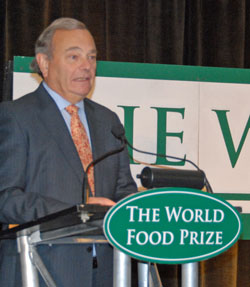These days, a dialogue about global food has to include biofuels – the two have become inseparable in recent years. At the World Food Prize Norman Borlaug Symposium this week in Des Moines many speakers are addressing how biofuels fit in the global food outlook.
 The keynote speaker for the symposium kickoff Wednesday was Sir Gordon Conway, who is chief scientific adviser for the UK. He talked about the spike in food prices over the past year and listed at least ten underlying causes, demand for biofuels being only one and he did not single it out as being a major culprit. He also pointed out the increasing global population, higher per capita income, increased demand for meat, higher prices for energy and fertilizer, and a shortage of arable land as some of the other factors.
The keynote speaker for the symposium kickoff Wednesday was Sir Gordon Conway, who is chief scientific adviser for the UK. He talked about the spike in food prices over the past year and listed at least ten underlying causes, demand for biofuels being only one and he did not single it out as being a major culprit. He also pointed out the increasing global population, higher per capita income, increased demand for meat, higher prices for energy and fertilizer, and a shortage of arable land as some of the other factors.
Conway stressed the need to address why we want to produce biofuels and the urgency to move quickly into second and even third generation biofuels – such as cellulosic ethanol from switchgrass and biodiesel from algae. “Maybe we should have a new World Food Prize on this,” Conway said. “In which we transform the world from one dependent on fossil fuels for energy and production of chemicals, into one that depends on plants as a basic source of our economy.”
Listen to Conway’s comments here:
[audio:http://www.zimmcomm.biz/world-food/wfp-08-conway-biofuels.mp3]
The World Food Prize was established in 1986 by Nobel Peace Prize winner Norman Borlaug to honor the achievements of individuals who have advanced human development by improving the quality, quantity or availability of food in the world. This year’s winners are former U.S. Senators George McGovern and Bob Dole, who are being honored for their work in establishing the McGovern-Dole international school-feeding program which has provided meals to feed more than 22 million children in 41 countries.


